Auburn University College of Veterinary Medicine

Growth - a word that describes life at the Auburn University College of Veterinary Medicine. Exciting growth is occurring in our class size and in our facilities.
Beginning with the class of 2015, class enrollment increased from 95 students to 120. Additional students will be nonresident / non-contract from states other than Alabama and Kentucky. Admitting more students with different backgrounds adds to the experience of the entire student body.
In addition to the growth in class size, construction is nearing completion on the new Bailey Small Animal Teaching Hospital and Veterinary Educational Wing. Phase one of the project includes three auditorium-style lecture rooms and 15 seminar/conference rooms.The new small animal teaching hospital will offers the latest in veterinary technology and health care delivery. The state-of-the-art facility, which opened in 2014, has enhanced the educational experience of veterinary students and those receiving postgraduate specialty training while offering the most advanced veterinary care available to our clients.
Veterinary Medicine - Admission to the College

Auburn University established the department of veterinary science and physiology in 1892. Since 1909, the Auburn University College of Veterinary Medicine has graduated more than 6,500 Doctors of Veterinary Medicine. The College of Veterinary Medicine, known for its collegial atmosphere and strong traditions, provides a broad-based education that prepares students to enter a variety of careers in veterinary medicine.
Admission to the program is competitive: 1132 students applied for admission for Fall. One hundred twenty students were admitted to the professional program. Forty were Alabama residents. Forty were contract students through the Southern Regional Education Board contract. The remaining are non-resident/non-contract students. In 2013, the average GPA of admitted students was 3.60, and the average GRE score (combined verbal and quantitative) was 1211. Successful applicants demonstrate superior academic ability as well as dedication to the profession, evidenced by work or volunteer experience with animals.
Kentucky students must provide proof of residency from their college/university or from their state council on post-secondary education. All applicants must apply through the Veterinary Medical College Application Service (VMCAS). An electronic application is available at www.aavmc.org.
In addition to completing the required pre-veterinary courses, students should work with one or more veterinarians to learn about career opportunities and responsibilities within the profession. Experience with both large and small animals is suggested.
While work and animal experience are necessary for admission, it is important to remember that academic ability is essential. The Admissions Committee selects students they believe can be successful in a rigorous four-year professional curriculum, and in the profession.
Graduate Program

Programs leading to both the Master of Science (MS) and Doctor of Philosophy (PhD) degrees in Biomedical Sciences are offered. The MS and PhD programs in Biomedical Sciences are college-wide and are administered by a committee of the Graduate Faculty and the Associate Dean for Research and Graduate Studies acting in conjunction with the departments. Both programs are open to veterinary graduates in all departments and to those with Bachelor's degrees.
A satisfactory Graduate Records Examination score is required for all graduate programs. GRE scores will be evaluated in conjunction with your academic record.
Anatomy, Physiology and Pharmacology
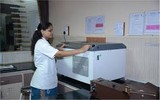 Anatomy, Physiology & Pharmacology offers a program of research, formal courses, and seminars in the following areas: computer-video applications in teaching, metabolic regulation, enzymology, sensory physiology, membrane physiology, biophysics, neurophysiology, cardiovascular physiology, endocrinology, basic and clinical pharmacology, toxicology, gross and neuro anatomy, morphology of reproductive organs and embryo ultra-structure, neurobiology, chemosensory mechanisms, ultrasonography, morphometrics, medical illustration, and osteopathology.
Anatomy, Physiology & Pharmacology offers a program of research, formal courses, and seminars in the following areas: computer-video applications in teaching, metabolic regulation, enzymology, sensory physiology, membrane physiology, biophysics, neurophysiology, cardiovascular physiology, endocrinology, basic and clinical pharmacology, toxicology, gross and neuro anatomy, morphology of reproductive organs and embryo ultra-structure, neurobiology, chemosensory mechanisms, ultrasonography, morphometrics, medical illustration, and osteopathology.
Food Animal Surgery and Medicine and Equine Surgery and Medicine
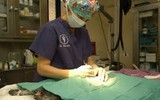 These sections offer large animal graduate programs and residency training in internal medicine, surgery, theriogenology, practitioner specialties, and pharmacy. Internal medicine emphasizes equine medicine, food animal medicine, and neonatology. Surgery emphasizes bovine male reconstructive surgery and orthopedic and upper respiratory surgery. Theriogenology comprises all areas of large animal reproduction, including dairy and beef herd health, with focus on male reproduction and in vitro fertilization. Anesthesia and intensive care programs are offered as are pharmacy programs with specialty training in veterinary clinical pharmacy and pharmacokinetics. Other areas of research interest are nutrition, metabolic diseases, bovine mastitis, cardiopulmonary disease, and thermography.
These sections offer large animal graduate programs and residency training in internal medicine, surgery, theriogenology, practitioner specialties, and pharmacy. Internal medicine emphasizes equine medicine, food animal medicine, and neonatology. Surgery emphasizes bovine male reconstructive surgery and orthopedic and upper respiratory surgery. Theriogenology comprises all areas of large animal reproduction, including dairy and beef herd health, with focus on male reproduction and in vitro fertilization. Anesthesia and intensive care programs are offered as are pharmacy programs with specialty training in veterinary clinical pharmacy and pharmacokinetics. Other areas of research interest are nutrition, metabolic diseases, bovine mastitis, cardiopulmonary disease, and thermography.
Pathobiology
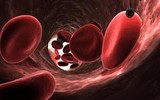 Programs leading to the combined residency-M.S. degree and residency-Ph.D. degree are offered in veterinary anatomic pathology and veterinary clinical pathology. General training objectives are to provide: (1) comprehensive training in anatomic and clinical veterinary pathology in preparation for certification by the AmericanCollege of Veterinary Pathologists; (2) experience in the teaching of veterinary pathology; and (3) research training in experimental pathology consistent with the fulfillment of requirements for the Master of Science or Doctor of Philosophy degree.
Programs leading to the combined residency-M.S. degree and residency-Ph.D. degree are offered in veterinary anatomic pathology and veterinary clinical pathology. General training objectives are to provide: (1) comprehensive training in anatomic and clinical veterinary pathology in preparation for certification by the AmericanCollege of Veterinary Pathologists; (2) experience in the teaching of veterinary pathology; and (3) research training in experimental pathology consistent with the fulfillment of requirements for the Master of Science or Doctor of Philosophy degree.
Radiology
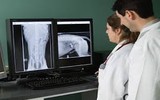 Study in the discipline of veterinary radiology includes physics, diagnostics, special procedures, nuclear medicine, and alternate imaging. Upon completion of the residency program, the individual will be qualified to write the certification examination in veterinary radiology. Active research includes: orthopedics, CNS and spinal cord diseases, comparative studies using alternate imaging, and oncology. Alternate imaging technologies available in the Holland Ware Imaging Center include M.R.I., C.T. scan, ultrasonography (with color Doppler), and conventional radiography.
Study in the discipline of veterinary radiology includes physics, diagnostics, special procedures, nuclear medicine, and alternate imaging. Upon completion of the residency program, the individual will be qualified to write the certification examination in veterinary radiology. Active research includes: orthopedics, CNS and spinal cord diseases, comparative studies using alternate imaging, and oncology. Alternate imaging technologies available in the Holland Ware Imaging Center include M.R.I., C.T. scan, ultrasonography (with color Doppler), and conventional radiography.
Scott-Ritchey Research Center
 The Scott-Ritchey Research Center is a privately endowed University Center within the College of Veterinary Medicine that is dedicated exclusively to research and research training on health problems of companion animals. The faculty of the Center conduct research on inherited diseases, molecular genetics, gene therapy, neuromuscular diseases, wound healing, and cardiopulmonary diseases. A research training program conducted by Center faculty is available for students ranging in experience from prebaccalaureate to postdoctoral.
The Scott-Ritchey Research Center is a privately endowed University Center within the College of Veterinary Medicine that is dedicated exclusively to research and research training on health problems of companion animals. The faculty of the Center conduct research on inherited diseases, molecular genetics, gene therapy, neuromuscular diseases, wound healing, and cardiopulmonary diseases. A research training program conducted by Center faculty is available for students ranging in experience from prebaccalaureate to postdoctoral.
Small Animal Surgery and Medicine
 These sections offer postgraduate and graduate studies for students with veterinary degrees. Selection for the postgraduate internships and for residencies in the specialties of veterinary internal medicine, neurology, ophthalmology, dermatology, and surgery is administered through the American Association of Veterinary Clinicians' Intern/Resident Matching Program. The 36 month residencies include pursuit of the MS degree and meet the requirements of the Specialty colleges. The current specialty and research interests of the faculty include the cardiovascular mechanisms in dogs and cats, implants in orthopedic surgery, pacemakers, oncology, dermatology, neurology, neurosurgery, and ophthalmology.
These sections offer postgraduate and graduate studies for students with veterinary degrees. Selection for the postgraduate internships and for residencies in the specialties of veterinary internal medicine, neurology, ophthalmology, dermatology, and surgery is administered through the American Association of Veterinary Clinicians' Intern/Resident Matching Program. The 36 month residencies include pursuit of the MS degree and meet the requirements of the Specialty colleges. The current specialty and research interests of the faculty include the cardiovascular mechanisms in dogs and cats, implants in orthopedic surgery, pacemakers, oncology, dermatology, neurology, neurosurgery, and ophthalmology.
Graduate Studies in Pathobiology
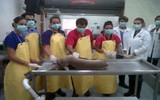
The Department of Pathobiology is an active participant in the Biomedical Sciences (BMS) and Cell and Molecular Biology (CMB) graduate programs. Students may obtain a Master of Science (MS) or Doctorate of Philosophy (PhD) through BMS while working with faculty mentors within the Department of Pathobiology.
Pathobiology also participates in the dual DVM-MS and DVM-PhD programs and offers combined residency - graduate degree programs in anatomic and clinical pathology. Students who enter the BMS program through the CMB program usually transfer to the BMS program at the end of their first year.
Combined Program (MS/PhD)

The combined program offers MS and PhD degrees for graduate students, residents in anatomic and clinical pathology, and veterinary students doing a combined DVM-MS or DVM-PhD degree. For more information go to the Pathobiology combined program site.
Applicants are encouraged to contact the following persons for more information: Dr. Calvin Johnson, anatomic pathology residency coordinator or Dr. Elizabeth Spangler, clinical pathology residency coordinator.
Dual Degree Program (DVM-MS/PhD)

Dual Degree (DVM/MS OR DVM/PHD) Program graduates will have strong backgrounds in both veterinary medicine and research and will be well prepared for careers in academia, industry and/or specialty clinics.
Students are admitted into the College of Veterinary Medicine program by applying to the Auburn University College of Veterinary Medicine (CVM) and to the graduate program via application to the Biomedical Sciences graduate program through Auburn University Graduate School (GS). Students must meet three criteria to be admitted to a dual degree:
- A personal statement in less than 500 words describing the applicants reasons to pursue the DVM and graduate curriculum simultaneously and stating long-term career goals.
- The applicant must be evaluated by the Associate Dean for Research and/or the BMS Graduate Program Committee.
- Provide three letters of recommendation, one from the student's major advisor.
- Cancer Biology and Genetics
- Immunology
- Hereditary Diseases
- Infectious Diseases / Parasitology
- Anatomic & Clinical Pathology
Students who enter the BMS program through the CMB (Cell and Molecular Biology) program usually transfer to the BMS program at the end of their first year.
Clinical Science Residencies
The Department of Clinical Sciences at Auburn University College of Veterinary Medicine offers residencies in the specialty areas listed below. The following criteria apply to all CVM residencies at Auburn University. Candidates for admission to the residency programs must be graduates of a college of veterinary medicine and have completed an internship or have equivalent practice experience. The residents will participate in an active research program under the supervision of a member of the Department of Clinical Sciences; this research may culminate in a Master's of Science degree.
The resident will be expected to take up to five credit hours of academic course work per semester. The resident will receive instruction in the clinical area of interest, and will work under the close supervision of faculty members specialized in the areas of interest in the different residency programs. The resident will be expected to assist in teaching senior veterinary students through lectures, seminars, and on rotations. The residents are also expected to attend, participate in, and contribute to resident seminars during the school year.
Candidates selected for participation in the program will receive a stipend and additional benefits specific to each program. All residencies will be no more than three years in length and are not tenure track positions. Foreign candidates selected for participation in the residencies must be able to provide all documentation required for admission to the United States.
Admission to the College
Auburn University established the department of veterinary science and physiology in 1892. Since 1909, the Auburn University College of Veterinary Medicine has graduated more than 6,500 Doctors of Veterinary Medicine. The College of Veterinary Medicine, known for its collegial atmosphere and strong traditions, provides a broad-based education that prepares students to enter a variety of careers in veterinary medicine.
Admission to the program is competitive: 1132 students applied for admission for Fall. One hundred twenty students were admitted to the professional program. Forty were Alabama residents. Forty were contract students through the Southern Regional Education Board contract. The remaining are non-resident/non-contract students. In 2013, the average GPA of admitted students was 3.60, and the average GRE score (combined verbal and quantitative) was 1211. Successful applicants demonstrate superior academic ability as well as dedication to the profession, evidenced by work or volunteer experience with animals.
Kentucky students must provide proof of residency from their college/university or from their state council on post-secondary education. All applicants must apply through the Veterinary Medical College Application Service (VMCAS). An electronic application is available at www.aavmc.org.
In addition to completing the required pre-veterinary courses, students should work with one or more veterinarians to learn about career opportunities and responsibilities within the profession. Experience with both large and small animals is suggested.
While work and animal experience are necessary for admission, it is important to remember that academic ability is essential. The Admissions Committee selects students they believe can be successful in a rigorous four-year professional curriculum, and in the profession.
Contact Us:106 Greene Hall Auburn, AL 36849-5517Phone: (334) 844-3700
Fax: (334)844-0387
Mail: cvmorgs@auburn.edu
Site: http://www.vetmed.auburn.edu/
